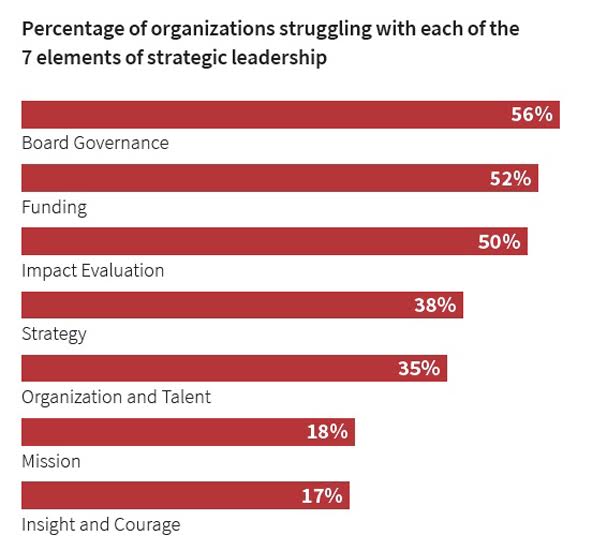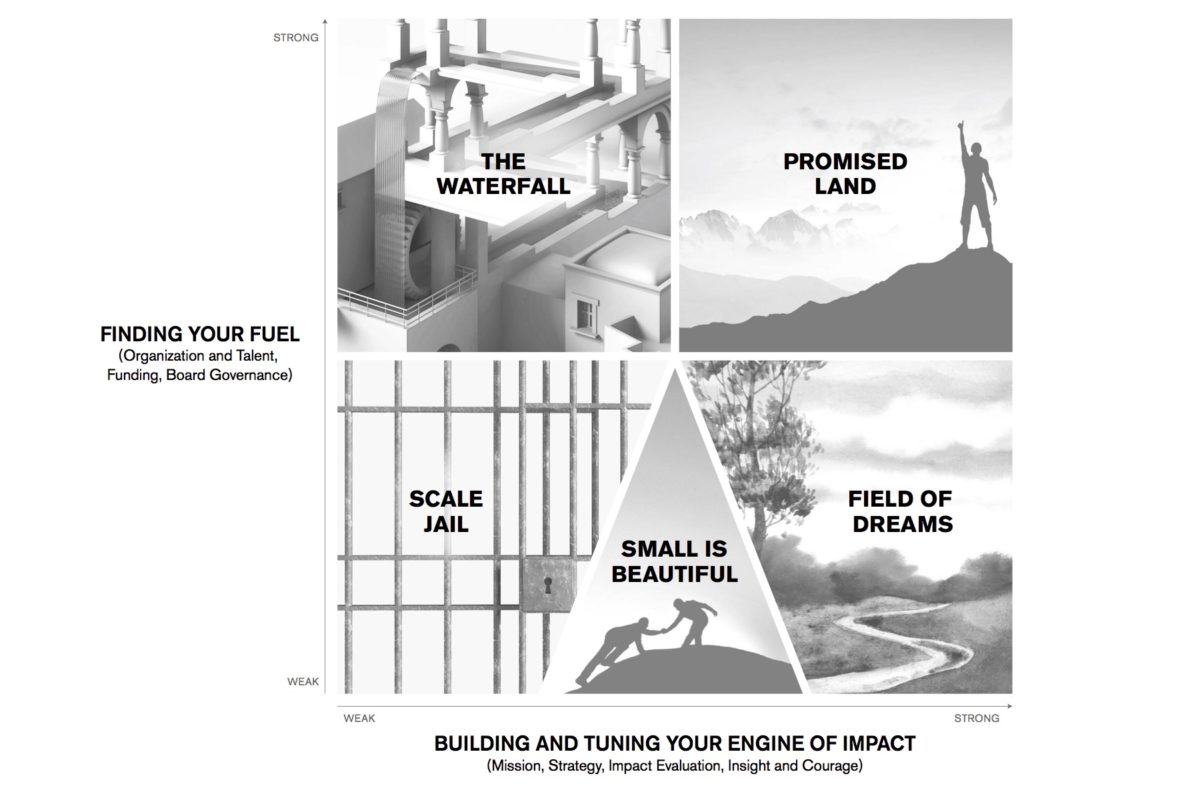News
Equipping Leaders To Optimize Their Impact: An Interview With Bill Meehan And Kim Starkey Jonker by Ashoka
Ashoka believes that there is nothing more powerful than a new idea in the hands of a social entrepreneur. Social entrepreneurs are relentless team-builders and problem-solvers who set new norms in their fields of work.
Ashoka was featured in Bill Meehan and Kim Starkey Jonker’s book, Engine of Impact, and its founder, Bill Drayton, was saluted for his visionary leadership as well as his insight and courage.
This interview of Meehan and Starkey Jonker, conducted by Ashoka, explores two of the many questions posed by the authors in their book, Engine of Impact: Essentials of Strategic Leadership in the Nonprofit Sector. Read the full interview here to learn more about equipping leaders for this new era of impact.
Ready or Not: A New Article for Bridgespan
“For nonprofit organizations, the current moment should be the best of times—a time when they can tap into new sources of funding and when conditions are ripe to leverage that funding to maximum effect.”
So begins a new article by Bill Meehan and Kim Jonker that the Bridgespan Group has published at its website. The article, titled “Most Nonprofits Aren’t Ready for the Coming Impact Era,” draws on findings from the Stanford Survey of Leadership and Management in the Nonprofit Sector to show that most organizations in the sector are falling short of their potential.  To ensure that the current era will indeed be “the best of times” for nonprofits, these organizations must improve their performance in areas that range from board governance to strategy. Meehan and Jonker follow their note of warning with a note of optimism: “by working intentionally and proactively to master the essentials of strategic leadership, organizations can seize the tremendous opportunity presented by the Impact Era,” they write.
To ensure that the current era will indeed be “the best of times” for nonprofits, these organizations must improve their performance in areas that range from board governance to strategy. Meehan and Jonker follow their note of warning with a note of optimism: “by working intentionally and proactively to master the essentials of strategic leadership, organizations can seize the tremendous opportunity presented by the Impact Era,” they write.
The article is available (in both web and PDF formats) here.
Are You Ready to Scale? A New Article in SSIR
Not all nonprofits are created equal, and not all nonprofits are equally ready to scale up their impact. In the last chapter of Engine of Impact, Bill Meehan and Kim Jonker argue that there are different levels—and different kinds—of scale-readiness. They also present the Readiness to Scale Matrix, an analytical tool that enables users to evaluate whether an organization has reached a point where it not only has achieved an ability to scale its impact but also has earned the right to do so.
Now Stanford Social Innovation Review has published an article by Meehan and Jonker that encapsulates the core logic of the Readiness to Scale Matrix. Titled “Earning the Right to Scale,” the piece offers a brief overview of the seven essential elements of strategic leadership and then describes how an organization’s performance in those elements determines its placement on the matrix.
Although nonprofits remain unequal in their readiness to scale, all of them have a right—and, arguably, a duty—to optimize their performance in the context of how they are performing currently. To help nonprofit leaders gauge how ready their organization is to expand its impact, Meehan and Jonker created the Engine of Impact Diagnostic. This resource is, in effect, an interactive version of the Readiness to Scale Matrix, and it complements the SSIR article.
To read that article, click here.
The “Business of Giving”—With Meehan and Starkey Jonker
“It’s one of those foundational books that only comes along every so often. It might even make a nice gift for someone.” So says Denver Frederick, host of the “Business of Giving” podcast, in concluding remarks to his recent interview with Bill Meehan and Kim Starkey Jonker about their book, Engine of Impact. In his opening remarks, Frederick observes that works that offer “isolated pieces of advice and wisdom” are plentiful. “What is often lacking, …” he argues, “is a serious, well-researched, and thoughtful source on how to make a real and lasting change.” In a wide-ranging conversation with Meehan and Starkey Jonker, Frederick explores their effort in Engine of Impact to fill that gap.
The podcast covers the challenge of focusing on organizational mission, the vicissitudes of nonprofit board governance, and what it takes for an organization to “earn the right” to scale. Frederick and his guest also venture into some controversial territory. Meehan, for instance, offers this provocative comment: “[O]ne of my favorite dinner party questions is to ask people what the biggest source of poverty alleviation is in the history of mankind, and nobody hardly ever gets it right. It’s capitalism in China. Number two is capitalism in India. It’s not aid to Africa.”
You can access the podcast here, on the Chronicle of Philanthropy website. Or you can click on the embedded audio player below.
A Question of Impact: Advice for Board Members
Nonprofit organizations often recruit people who have been successful in the business sector to serve on their board of directors. It’s a practice that can work well, enabling a nonprofit to gain valuable perspective from smart professionals—but only if those professionals are equipped to engage actively and meaningfully both in board meetings and in the work of the organization. That’s a big “if,” and it raises lots of questions for board members whose experience lies mainly outside the nonprofit sector.
It’s a practice that can work well, enabling a nonprofit to gain valuable perspective from smart professionals—but only if those professionals are equipped to engage actively and meaningfully both in board meetings and in the work of the organization. That’s a big “if,” and it raises lots of questions for board members whose experience lies mainly outside the nonprofit sector.
In fact, mastering the challenge of nonprofit board service starts with raising questions. In a new feature article for McKinsey Quarterly, Bill Meehan and Kim Jonker present a brief guide to doing precisely that. They write:
If you know how to probe, nudge, and prod, you can help your board perform better. Doing so starts with courage. In our experience, nonprofit board members are often reluctant to contribute actively to discussions for fear that they will appear uninformed or cause an embarrassing ruckus. To be effective, you must overcome that fear. And then you must ask questions. Ask all your questions, even ones you fear might seem stupid, and keep asking them until you figure out what the smart questions are.
The article (“The Four Questions to Ask When Serving on a Nonprofit Board”) appears in the December 2017 issue of McKinsey Quarterly. You can read it here.
Going Deep: Manville Interviews Meehan
“Americans today are looking for some ‘common ground,’ …” Bill Meehan told Brook Manville in a recently published interview. “Our associative initiatives are a formal sector now. [That sector is] perfectly positioned to give us all a chance to do something meaningful without politics. It’s a perfect antidote for today’s dysfunction—because when people join in shared purpose, they see they have more in common than they first thought.”
 Manville, a consultant and executive coach, spoke with Meehan in his role as a regular contributor to Forbes.com. The interview ranges widely but also delves deeply into “what it takes” for social sector leaders both to achieve real impact in the world and to achieve personal meaning in their work. Meehan doesn’t sugarcoat the challenges that come with making this career choice: “Nonprofit leaders have to get good at keeping things going, while sacrificing for years,” he says. “Because success can be so elusive to define, the hill can be even steeper.” But he highlights the rewards as well: “[P]ersonal meaning drives our spirit. So why not help make a better world?”
Manville, a consultant and executive coach, spoke with Meehan in his role as a regular contributor to Forbes.com. The interview ranges widely but also delves deeply into “what it takes” for social sector leaders both to achieve real impact in the world and to achieve personal meaning in their work. Meehan doesn’t sugarcoat the challenges that come with making this career choice: “Nonprofit leaders have to get good at keeping things going, while sacrificing for years,” he says. “Because success can be so elusive to define, the hill can be even steeper.” But he highlights the rewards as well: “[P]ersonal meaning drives our spirit. So why not help make a better world?”
You can read Manville’s piece here.
“Your Engine of Impact”—a GuideStar Blog Series
In advance of the publication of Engine of Impact, and in conjunction with release of the Stanford Survey on Leadership and Management in the Nonprofit Sector, GuideStar launched what will ultimately be an eight-part series of posts by Bill Meehan and Kim Jonker.  The series, called “Your Engine of Impact,” will cover each of the seven elements that make up their model of strategic leadership, and it will conclude with a post on the role that strategic leadership plays in organizational scaling and in scaling impact.
The series, called “Your Engine of Impact,” will cover each of the seven elements that make up their model of strategic leadership, and it will conclude with a post on the role that strategic leadership plays in organizational scaling and in scaling impact.
Jacob Harold, president and CEO of GuideStar, wrote a special introductory post for the series. In his post, Harold also cites GuideStar-relevant findings from the Stanford Survey. And he makes a nod toward Meehan’s long history of supporting GuideStar and its mission:
Bill’s involvement in GuideStar runs deep. He was an early supporter of efforts by GuideStar founder Arthur “Buzz” Schmidt to leverage technology in a way that would empower donors to evaluate nonprofits. Bill also served on the GuideStar board from 1996 to 2012, and he holds the title of chair emeritus. Engine of Impact is, among other things, a culmination of Bill’s longstanding drive to bring greater rigor to nonprofit leadership.
Here are posts in the series that have appeared so far. (We will update the list as new posts go up at the GuideStar Blog.)
- Survey Says: Nonprofits Have Room to Grow (introduction by Jacob Harold)
- Your Engine of Impact: Mission
- Your Engine of Impact: Strategy
- Your Engine of Impact: Impact Evaluation
- Your Engine of Impact: Insight and Courage
- Your Engine of Impact: Organization and Talent
- Your Engine of Impact: Funding
- Your Engine of Impact: Board Governance
- Your Engine of Impact: Scaling
A Systems-Level Look at the Social Sector
The target audience of Engine of Impact includes executives and staff members at frontline nonprofit organizations whose work has the potential to yield tangible, measurable results. The chief goal of Bill Meehan and Kim Jonker in writing the book, in other words, was to inform and inspire those who are in a position to build, tune, and fuel a true “engine of impact.” Yet the authors acknowledge that nonprofits make up just one part of a system that in various ways fails to support the practice of strategic leadership.
 In an article for Stanford Social Innovation Review, Meehan and Jonker flesh out this critical point by describing steps that systems-level actors can take to enable nonprofit organizations to maximize their performance. The piece focuses on three of the seven components of strategic leadership—components that, according to findings from the Stanford Survey of Leadership and Management in the Nonprofit Sector, are most likely to pose a challenge for nonprofits. (See the chart above, which appears in the report on this survey.) Meehan and Jonker write:
In an article for Stanford Social Innovation Review, Meehan and Jonker flesh out this critical point by describing steps that systems-level actors can take to enable nonprofit organizations to maximize their performance. The piece focuses on three of the seven components of strategic leadership—components that, according to findings from the Stanford Survey of Leadership and Management in the Nonprofit Sector, are most likely to pose a challenge for nonprofits. (See the chart above, which appears in the report on this survey.) Meehan and Jonker write:
[W]hile individual nonprofits have work to do, they alone can’t accomplish the sector-wide transformation that is so necessary. Much of the work of building more effective organizations needs to start, in particular, with the board members who oversee nonprofits and with the donors who sustain them financially. Consider the three areas of performance [board governance, funding, impact evaluation] in which nonprofits are most likely to struggle. In each, influential players within the nonprofit sector can and must help nonprofits develop strategic leadership capabilities.
The article, “Filling Essential Gaps in Nonprofit Leadership,” is available here.
Insights on Impact—a Stanford Business Interview
 In an article titled “Four Ways Nonprofits Can Increase Their Impact,” Theodore Kinni offers several nuggets of insight from an interview that he conducted with Bill Meehan and Kim Starkey Jonker. The piece appears in the Autumn 2017 issue Stanford Business, a magazine for alumni of Stanford Graduate School of Business, and Kinni quotes an observation by Starkey Jonker on how Engine of Impact is likely to resonate with members of that audience: “Stanford GSB alums are in a wonderful position to have a great deal of impact in the nonprofit sector. They will be familiar with many of the concepts in our book and, as donors and board members, they can make a big difference in the sector, even when they have day jobs outside the sector.”
In an article titled “Four Ways Nonprofits Can Increase Their Impact,” Theodore Kinni offers several nuggets of insight from an interview that he conducted with Bill Meehan and Kim Starkey Jonker. The piece appears in the Autumn 2017 issue Stanford Business, a magazine for alumni of Stanford Graduate School of Business, and Kinni quotes an observation by Starkey Jonker on how Engine of Impact is likely to resonate with members of that audience: “Stanford GSB alums are in a wonderful position to have a great deal of impact in the nonprofit sector. They will be familiar with many of the concepts in our book and, as donors and board members, they can make a big difference in the sector, even when they have day jobs outside the sector.”
The article is available here, at the Stanford GSB website; it’s also available here, as a PDF document. In both formats, the piece contains a brief excerpt from the book that outlines the “engine of impact” model.
An Excerpt on Strategy
Stanford Social Innovation Review has published an excerpt from Engine of Impact that addresses a vital question for the nonprofit sector: How can a nonprofit apply concepts from business strategy to the way that it structures and plans its work? In the past, some people in the sector have doubted the relevance of such concepts to their efforts. After all, they point out, nonprofits don’t engage in the kind of market competition that sets the conditions for business strategy. But, as Bill Meehan and Kim Jonker demonstrate, effective nonprofit leaders understand that a focus on strategy is essential to achieving significant impact.
 In this excerpt, Meehan and Jonker summarize a landmark concept from the discipline of competitive strategy—the idea of core competencies, which C.K. Prahalad and Gary Hamel set forth in a 1990 article—and then show how that concept applies to one organization, Equal Opportunity Schools. The excerpt illustrates the clarity of insight that nonprofits can achieve by rigorously analyzing what they can do in each part of their value chain.
In this excerpt, Meehan and Jonker summarize a landmark concept from the discipline of competitive strategy—the idea of core competencies, which C.K. Prahalad and Gary Hamel set forth in a 1990 article—and then show how that concept applies to one organization, Equal Opportunity Schools. The excerpt illustrates the clarity of insight that nonprofits can achieve by rigorously analyzing what they can do in each part of their value chain.
You can read the excerpt here.
Subscribe to receive updates on new content




